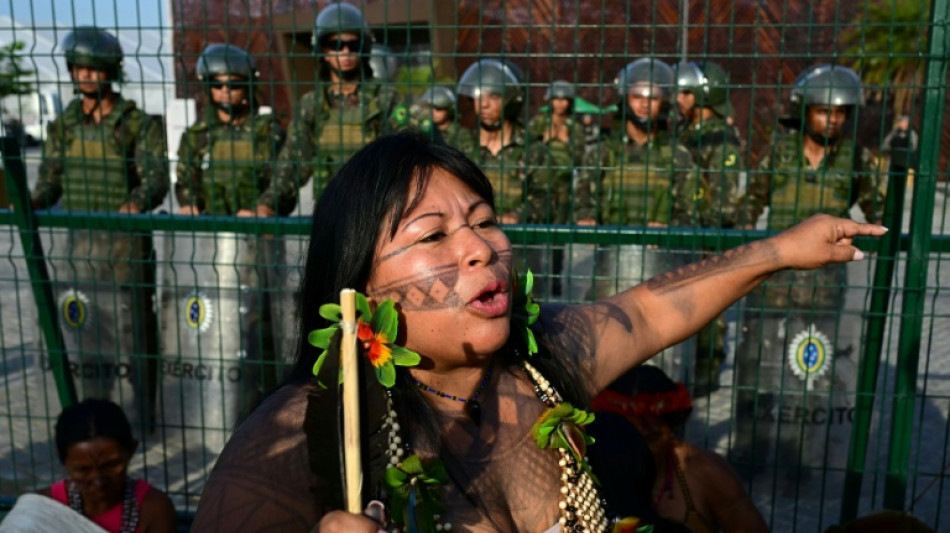
-
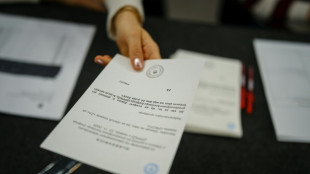 Slovenia holds crunch vote on contested assisted dying law
Slovenia holds crunch vote on contested assisted dying law
-
Aonishiki beomes first Ukrainian to win sumo tournament

-
 Holders Australia drawn with New Zealand in Rugby League World Cup
Holders Australia drawn with New Zealand in Rugby League World Cup
-
Vietnam flooding kills at least 90
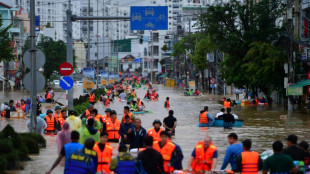
-
 Muthusamy's maiden Test century powers South Africa to 428-7
Muthusamy's maiden Test century powers South Africa to 428-7
-
Myanmar junta says nearly 1,600 foreigners arrested in scam hub raids

-
 US signals room for negotiation on Ukraine plan ahead of talks
US signals room for negotiation on Ukraine plan ahead of talks
-
Verstappen wins Las Vegas F1 Grand Prix, Norris edges closer to crown

-
 Muthusamy anchors South Africa to 316-6 in second India Test
Muthusamy anchors South Africa to 316-6 in second India Test
-
Vietnam flood death toll rises to 90

-
 US denies pushing Russian 'wish list' as Ukraine plan
US denies pushing Russian 'wish list' as Ukraine plan
-
Harden's 55 leads Clippers win as Pistons streak hits 12

-
 Kim's first top-10 in 14 years as Ballester wins maiden pro title
Kim's first top-10 in 14 years as Ballester wins maiden pro title
-
Gotham crowned NWSL champions after Lavelle breaks Spirit

-
 Trump signals room for negotiation on Ukraine plan ahead of talks
Trump signals room for negotiation on Ukraine plan ahead of talks
-
Head shapes up as solution for Australia's opening woes

-
 Tomorrowland bets on Chinese dance music fans with first indoor event
Tomorrowland bets on Chinese dance music fans with first indoor event
-
England slammed as 'brainless' after first Ashes Test capitulation

-
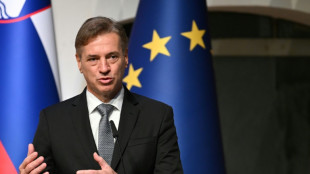 Slovenia to hold new vote on contested assisted dying law
Slovenia to hold new vote on contested assisted dying law
-
'Beer tastes better' for Eramsus after win over Irish

-
 No.1 Jeeno leads by six at LPGA Tour Championship
No.1 Jeeno leads by six at LPGA Tour Championship
-
Neres double fires Napoli top in Italy

-
 Bielle-Biarrey masterclass helps France hold off Australia
Bielle-Biarrey masterclass helps France hold off Australia
-
Pogba returns in Monaco loss as PSG stay top in France

-
 COP30: Key reactions to climate deal
COP30: Key reactions to climate deal
-
What did countries agree to at COP30?

-
 Harden's club-record 55 points leads Clippers over Hornets
Harden's club-record 55 points leads Clippers over Hornets
-
Amazon climate deal a 'win' for global unity but fossil fuels untouched

-
 Boos, blowups and last-minute pause as a chaotic COP30 closes out
Boos, blowups and last-minute pause as a chaotic COP30 closes out
-
Farrell proud of Ireland after 'mad' Test with South Africa

-
 Gaza civil defence says 21 killed in Israeli strikes
Gaza civil defence says 21 killed in Israeli strikes
-
South Africa beat ill-disciplined Irish to end Dublin drought

-
 South Africa's Marx named World Rugby player of the year
South Africa's Marx named World Rugby player of the year
-
Ukraine, US head for talks on Trump's plan to end war

-
 Newcastle dent Man City's title bid thanks to Barnes double
Newcastle dent Man City's title bid thanks to Barnes double
-
Brazil's Bolsonaro detained for trying to break ankle bracelet and flee
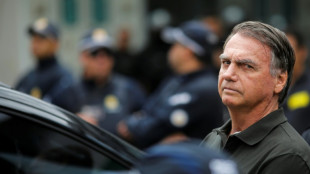
-
 Slot takes blame after Liverpool stunned by Forest
Slot takes blame after Liverpool stunned by Forest
-
Lampard hails 'outstanding' Coventry after comeback win over West Brom

-
 Thousands rally in France after murder linked to anti-drug activism
Thousands rally in France after murder linked to anti-drug activism
-
Geopolitical fractures and Ukraine worries sap G20 summit
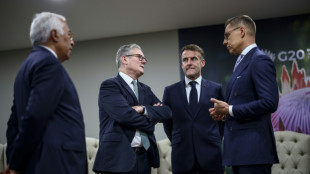
-
 Robertson praises reshuffled All Blacks after Wales mauling
Robertson praises reshuffled All Blacks after Wales mauling
-
Spain to face Italy in Davis Cup final

-
 Ukraine, US to hold Geneva talks on Trump's plan to end war
Ukraine, US to hold Geneva talks on Trump's plan to end war
-
Lewandowski will remember scoring first goal at new Camp Nou 'forever'

-
 Thousands march in France to demand action on violence against women
Thousands march in France to demand action on violence against women
-
S.Africa G20 declaration highlights: minerals, debt, climate
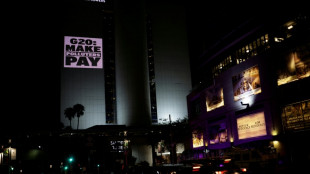
-
 Barca thrash Athletic to inaugurate rebuilt Camp Nou in style
Barca thrash Athletic to inaugurate rebuilt Camp Nou in style
-
Forest beat Liverpool to add to English champions' woes

-
 Liverpool stunned by Forest, Chelsea boost title charge
Liverpool stunned by Forest, Chelsea boost title charge
-
McKenzie guides New Zealand to another win over Wales


Brazil's planned railway to Amazon draws fire on margins of COP30
Indigenous protesters at UN climate talks in Brazil have zeroed in on a major grievance: A planned railway that would stretch almost the distance from London to Berlin and cut through the Amazon rainforest.
To farmers, the Ferrograo -- meaning Grain Railway -- would be a logistical revolution.
Critics see yet another massive infrastructure project coming to threaten the Amazon, undermining President Luiz Inacio Lula da Silva's commitment to the environment.
- What is the idea behind the Ferrograo? -
Brazil is the world's largest exporter of soybeans and corn, much of which is produced in the central state of Mato Grosso.
Currently, this cargo travels long distances by truck to either southern seaports or northern river ports.
For over a decade, Brazilian governments have tried to advance a 933-kilometer (580-mile) railway that would link Sinop in Mato Grosso to the northern river port of Miritituba.
From there, grain can reach the Amazon River and the Atlantic Ocean.
- What do supporters of the project say? -
Elisangela Pereira Lopes, a technical advisor with the CNA, Brazil's main farmer's organization, told AFP the railway was "essential to guarantee the competitiveness of Brazilian agribusiness."
She said that Mato Grosso, responsible for about 32 percent of national grain production "needs a more efficient logistics route to keep pace with the sector's growth."
Lopes said the railway was expected to cut the logistics cost of grain exports by up to 40 percent, while reducing road traffic and the associated CO2 emissions.
- What do the critics say? -
Mariel Nakane of the Socio-Environmental Institute (ISA) told AFP the railway will impact Indigenous lands and drive deforestation and land grabbing.
She said the switch by agribusiness in the last decade to exporting their goods more cheaply via northern river ports had already transformed the Tapajos River that the Miritituba port sits on.
"Riverside communities are being expelled... they can no longer fish in some regions because now it's just ports and this barge traffic.
"The idea is to install the railway and have it increase the volume transported on this route by five times."
Meanwhile, she fears a free-for-all in areas already vulnerable to deforestation.
Nakane said Brazil's current licensing procedures were not enough to protect the rainforest and its residents.
She pointed to other controversial projects, such as oil exploration near the Amazon River -- which began in October -- and plans to pave the BR-319, a major highway in the rainforest.
"The government is not capable of doing this right. It's very easy for the government to claim that it's committed to the climate agenda, but sweep these controversial projects under the rug."
- Why has this come up at COP climate talks? -
With the eyes of the world on Belem during the UN climate summit, Indigenous communities have sought to cast a spotlight on their grievances, such as the Ferrograo.
Protesters are also furious about a decree signed by Lula in August establishing major Amazon rivers, including the Tapajos, as priorities for cargo navigation and private port expansion.
"We will not allow it because it is our home, our river, our forest," said Indigenous leader Alessandra Korap of the Munduruku people.
"The river is the mother of the fish."
- What is the current status of the project? -
Brazil's environmental agency Ibama said to AFP in a statement that "the licensing process for the Ferrograo railway is in its initial stage, with an assessment of its environmental viability."
However, the process was suspended in 2021 by Supreme Court judge Alexandre de Moraes after a constitutional challenge to plans to alter the limits of a national park to build the railway.
Moraes allowed the case to resume in 2023, and the court began hearing it again last month.
Moraes -- a powerful figure in Brazil who has personally led several major investigations -- voted to allow the project to go ahead.
However, the hearing is currently paused after another judge asked for more time to analyze the case.
V.Said--SF-PST

